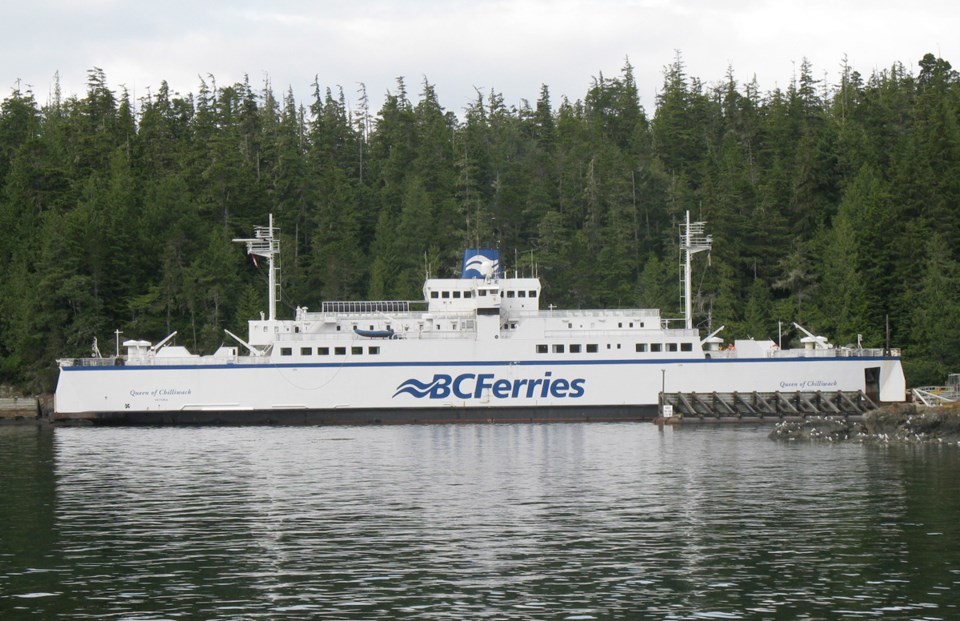Small coastal communities will be devastated by cuts to B.C. Ferries service announced Monday, says a Vancouver Island mayor.
B.C. Ferries is trying to recoup its losses on minor routes by cutting sailings with historically low ridership. But community leaders say axing routes is the wrong way to go and the cuts could push their already fragile economies to the breaking point.
“I was absolutely gob-smacked at the extent of the cuts, all the way up the coast,” said Bev Parnham, mayor of Port Hardy.
She said the number of vehicles on a ferry isn’t the way to measure its viability. “Is the viability of a road determined by the number of cars that drive on it? I don’t think it is.
“This is our highway, this is the way we carry people and goods, the way we have industry,” Parnham said. “I just think this is so incredibly shortsighted for B.C. Ferries ... they are absolutely not looking at what the real impact of these ferry cuts will be. They’ll devastate some of these smaller communities.”
Smaller coastal communities depend on the ferry service more than larger centres but seem to have less influence when dealing with B.C. Ferries, Parnham said.
Darla Blake, chief administrative officer of the Central Coast Regional District agreed, saying the cuts will bring hardship to Bella Coola.
B.C. Ferries plans to retire the Queen of Chilliwack, which has a capacity of 115 vehicles and had been serving the mid-coast in the summer, and rely on the MV Nimpkish, which holds only 16 cars, on a year-round basis.
“It will basically take a couple days to get over to [Vancouver] Island,” said Blake, adding the schedule allows for those trips only twice a month.
Goods packed in semi-trailers will vie for space with passenger vehicles.
The cuts “were right out of the blue,” Blake said. “It’s incredibly disappointing. They’re focused on B.C. Ferries — they haven’t really focused on the needs of the communities.”
The impact on Bella Coola’s 1,500 residents will be especially hard in the summer, when tourists take the ferry to Bella Coola and drive inland to Williams Lake and on to Vancouver, Blake said. Motels, restaurants and other tourist services rely on the ferry to bring in tourist dollars.
Communities like Bella Bella rely on B.C. Ferries to get food delivered from Port Hardy, Blake said.
Chief Marilyn Slett of the Heiltsuk Tribal Council in Bella Bella called B.C. Ferries’ consultation process “a sham,” saying there are concerns about high food costs due to infrequent shipping and access to health care.
The corporation “should be working with us to find a solution and not coming to our community telling us what kind of cuts we’re going to face,” Slett said in a statement.
However, B.C. Ferries still has a fan in Port McNeill Mayor Gerry Furney.
“For people to drive to Port Hardy and expect there to be a ferry ready to take them to Prince Rupert or Bella Bella is just impractical,” he said.
“As one of the people who makes decisions on taxes, I hear it fast and quickly the moment someone feels they’re being charged unfairly or unnecessarily.”
Furney said he’s a “major, major supporter” of B.C. Ferries. “Having ridden on ferries in New Zealand, Ireland, England, Scotland, I can tell you the service in B.C. is second to none.”
The cutback of evening service between Crofton and Vesuvius Bay isn’t a surprise to Harold Swierenga, head of the B.C. Ferries advisory committee on Saltspring Island.
The last two sailings from each side are being cut, meaning the last run from Crofton will leave at 6:55 p.m. from Monday to Thursday and 8 p.m. Friday to Sunday. The last sailing from Vesuvius would be 6:20 p.m. Monday to Thursday and 7:25 p.m. Friday through Sunday.
The Vesuvius-Crofton run is heavily used by commuters, but they are at home when the later sailings leave port, Swierenga said.
About 60 students also use that route to attend school, and might be affected if they attend after-school activities.
“This will affect mostly people who’ve got over [to Vancouver Island] to go shopping for the day or attend social things,” Swierenga said.
The impact of cutting the last two sailings between Quadra Island and Campbell River will have a minimal impact on Walcan Seafoods, which processes fresh seafood for export, said human resources manager Tom Skillman.
The Quadra Island plant employs 70 to 160 people, many of whom live in Campbell River and commute by ferry.
“What it will do is we’ll lose a potential hour of production with workers having to get home [to Campbell River],” Skillman said.
The business needs to get fresh product on and off Vancouver Island quickly, so the morning sailings are essential, he said.
“If they started hacking away at the morning [sailings], we’d be absolutely furious,” Skillman said.



